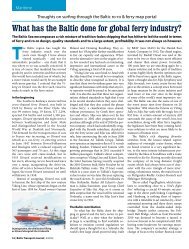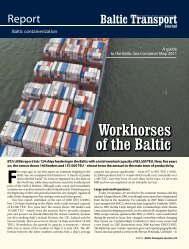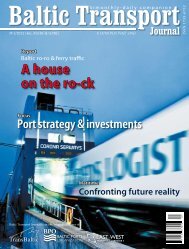Create successful ePaper yourself
Turn your PDF publications into a flip-book with our unique Google optimized e-Paper software.
Hinterland<br />
Private carriers on fight for rail cargo in Poland<br />
State monopoly and its aftermath<br />
After several years of dynamic growth, the cargo shipping market<br />
in Poland has apparently slowed down.<br />
However, the structure of the<br />
market share has changed<br />
significantly and private carriers<br />
are gaining momentum.<br />
In 2006 the railway cargo<br />
shipping market in Poland<br />
grew by 7% compared to 2005. According to<br />
forecasts for the following year, the market<br />
should have grown by 2.5-3%; however, in<br />
2007 shipping operations, i.e., the number of<br />
started cargo trains, grew by only 0.2% , and<br />
the total volume of carried cargo by 1%.<br />
Analysts from the TOR Economic Advisors<br />
Team stress that the cause of the downturn<br />
lies in the decreasing volume of coal transported<br />
by rail from the mines in Upper Silesia in<br />
the south of Poland to the <strong>Baltic</strong> Sea ports in<br />
Gdańsk, Gdynia and Szczecin-Świnoujście.<br />
“Polish railways depend on coal shipping. If<br />
they do not find other cargos in <strong>2008</strong> the volumes<br />
will fall. This trend may not only hit the state carrier,<br />
PKP Cargo, but also private companies,” says<br />
Marcin Kamola from TOR.<br />
However, according to another analyst<br />
Łukasz Malinowski, “PKP Cargo should be<br />
blamed for its overall poor results as the mar-<br />
60 | <strong>Baltic</strong> <strong>Transport</strong> <strong>Journal</strong> | 3/<strong>2008</strong><br />
ket has not grown but private carriers have<br />
taken over the cargo it used to transport in<br />
previous years.” Malinowski assures that in<br />
spite of the general standstill on the market,<br />
a constant and very dynamic growth of<br />
shipping may be observed among private<br />
operators.<br />
Polish tracks users<br />
PKP Cargo is responsible not only for<br />
cargo shipping but it is also the owner of<br />
a definite majority of state locomotives.<br />
There is one more state carrier in Poland,<br />
PKP LHS. It operates only one line with<br />
a gauge of 1,520 mm, i.e., compatible with<br />
the size used in the former USSR countries.<br />
The line, at present used more and more for<br />
container transport, is almost 400 km long<br />
in Poland and ends in Sławków where a huge<br />
dry container terminal is being developed.<br />
According to Matthias Raith, Member<br />
of the Board of CTL Logistics SA, the liberalisation<br />
obstacles are not at all a Polish<br />
matter. „Rail market in Europe is just formally<br />
liberalized, while we are still state<br />
monopolies operating in the democratic environment”,<br />
Raith commented on the recent RailPort<br />
<strong>2008</strong> Conference in Warsaw, stressing an example<br />
of the German government’s open support for<br />
Deutsche Bahn’s leading function. Another problem<br />
pointed on the agenda was a matter of still<br />
very low share of the modern goods transported<br />
by rail. Containerised traffic in Poland took only<br />
5,3% of the overall railway shipment volumes in<br />
2007, as it was brought on the conference by Zbigniew<br />
Zarychta, Member of the Board of PKP PLK.<br />
This particularily represents the nowadays meaning<br />
of private carriers to the market, as they are<br />
mostly active in the intermodal sector.<br />
There are 15 major private companies in this<br />
sector in Poland with the top five players holding<br />
almost 40% of the whole market.<br />
Success does not come easily<br />
At the beginning of <strong>2008</strong> the decision of the<br />
Polish Office of Competition and Consumer Protection<br />
became valid. It imposed a penalty of PLN<br />
51m (EUR 14.3m) on PKP Cargo for its monopolistic<br />
practices. The problem started several years<br />
ago when private business started to enter the market<br />
and PKP Cargo executed long-term contracts<br />
which, according to the Office, were made to prevent<br />
the creation of competition. The second proceedings<br />
are pending, these may result in another<br />
fine of PLN 10m (EUR 2.8m). This time PKP Cargo<br />
is being accused of breaking the competition law by<br />
giving privileges to one operator only.<br />
The list of complaints from private carriers is<br />
long. PKP Cargo is said to receive preferential rates<br />
for using tracks administered by its group partner,<br />
also state-owned PKP PLK. It is also suspected of<br />
being prioritized in creating timetables.<br />
Private companies hope that the complete<br />
liberalization of the market introduced by the EU<br />
will lift such barriers and that soon most cargos on<br />
Polish tracks will find their way to wagons.<br />
PKP Cargo under its new management is also announcing<br />
a new business attitude. “We shall be open<br />
to the economic environment, and we shall be more<br />
competitive as far as our products and their quality<br />
are concerned. We shall not be continuing, however,<br />
the devastating price war with our competitors as it<br />
was done before,” says new President Wojciech Balczun.<br />
“I wish to implement changes as soon as possible<br />
in the company’s organization in order to make<br />
the company more market-oriented. If we seriously<br />
contemplate entering the stock exchange some time<br />
in 2010, PKP Cargo must change,” he declares.<br />
Paweł Rydzyński

















